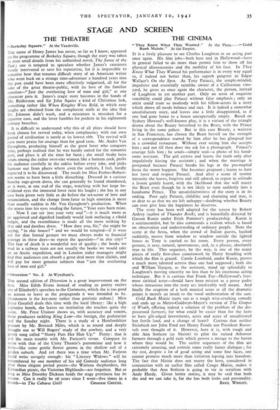THE CINEMA
They Knew What They Wanted." At the Plaza.—" Gold Rush Maisie." At the Empire.
IT is a lively pleasure to see Charles Laughton in an acting part once again. His film jobs—both here and in Hollywood—have in general failed to do more than permit him to show off his physical idiosyncrasies and the mobility of his face. In They Knew What They Wanted his performance is in every way equal to, if indeed not better than, his superb gangster in Edgar Wallace's On the Spot. As Tony Patucci, the simple-minded, impulsive and essentially saintlike owner of a Californian vine- yard, he gives us once again the character, the person, instead of Laughton in yet another part. Only an actor of exquisite sensibility could play Patucci without false emphasis ; only an artist could team so modestly with his fellow-actors in a story which above all needs balance and tact. It is indeed a somewhat unsatisfactory story, and leaves one a little disappointed, as if ' one had gone home to a house unexpectedly empty. Based on Sydney Howard's well-known play, it is a variant of the triangle drama about the Beauty betrothed to the Beast, with the Prince living in the same palace. But in this case Beauty, a waitress in San Francisco, has chosen the Beast herself on the strength of a correspondence started by him after he has glimpsed her in a crowded restaurant. Without ever seeing him she accepts him ; and not till then does she ask for a photograph. Patucci's courage fails him ; he sends—simple soul—a photo of his hand- some assistant. The girl arrives and learns the truth only after impulsively kissing the assistant ; and when the marriage is postponed because Patucci breaks his legs at the pre-nuptial fiesta the worst happens. She becomes pregnant ; learns to hate her lover and respect Patucci. And after a scene of stormy intensity she leaves, forgiven and still adored, to repeat in solitude a lesson grimly learnt, with the likelihood that she will marry the Beast even though he is not likely to turn suddenly into a handsome Prince. The unsatisfactoriness of the story is in its ending. Poor ugly Patucci, childlike and charming and true, is so dear to us that we are left unhappy—doubting whether Beauty can ever give him the happiness he deserves.
The story has been well adapted for the screen by Robert Ardrey (author of Thunder Rock), and is beautifully.directed by Garson Kanin under Erich Pommer's producership. Kanin is a sentimentalist, but he also commands a realism which is based on observation and understanding of ordinary people. Note the scene at the fiesta, when the crowd of Italian guests, hushed suddenly, moves from window to window outside the lighted house as Tony is carried to his room. Every person, every gesture, is easy, natural, spontaneous, and, in a phrase, absolutely true to life. This sequence, by the way, is one of the many pieces of really first-class camerawork by Harry Stradling with which the film is graced. Carole Lombard, under Kanin, proves a much more talented actress than one had supposed ; both she and William Gargan, as the assistant, stand up splendidly to Laughton's moving sincerity no less than to his enormous acting technique. But it is curious that Frank Fay—Hollywood's fore- most satirical actor—should have been miscast as a prosy padre whose intrusions into the story are intolerably well meant. And finally the eruption of a lush musical score at all the dramatic points is merely an insult to the vocal orchestration of the cast.
Gold Rush Maisie starts out as a tough wise-cracking comedy and ends up as Metro-Goldwyn-Mayer's version of The Grapes of Wrath, offering indeed a solution of the problem of the dis- possessed farmers; for what could be easier than for the hero to have gilt-edged investments, acres and acres of uncultivated but fertile land, and a change of heart? Curious that neither Steinbeck nor John Ford nor Henry Fonda nor President Roose-
velt ever thought of it. However, here it is, with tough and able Ann Sothem (as Maisie) to pilot the ruined Arkansas farmers through a gold rush which proves a mirage to the haven where they would be. The earlier sequences of the film are extremely amusing, and contain some really funny dialogue ; for the rest, despite a lot of good acting and some fine faces, one cannot promise much more than irritation lapsing into boredom. The fact that Maisie does not marry the hero, considered in
conjunction with an earlier film called Congo Maisie, makes it probable that Ann Sothern is going to vie in serialism with
Andy Hardy. Given better stories, it may be said that both she and we can take it, for she has both looks and personality.
BASIL WRIGHT.


























 Previous page
Previous page